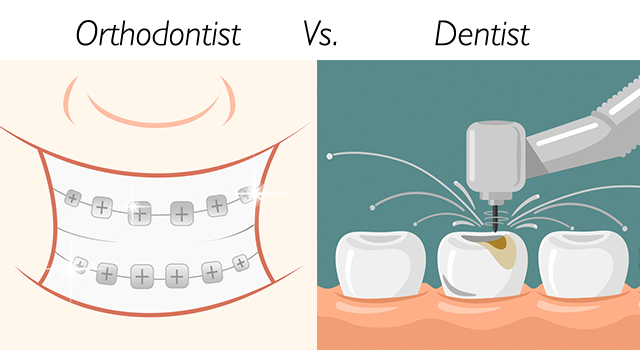 There’s no doubt that attending to the state of your dental health is important. However, just as there are different types of medical professionals who help you see to various parts of your overall medical health, so are there different dental professionals who attend to specific areas of dental health. Like the medical field, the dentistry field encompasses a wide scope of specialties. In order to ensure that you receive the best care possible, it’s important to know the difference between all the different types of dental professionals and what their areas of experience are.
There’s no doubt that attending to the state of your dental health is important. However, just as there are different types of medical professionals who help you see to various parts of your overall medical health, so are there different dental professionals who attend to specific areas of dental health. Like the medical field, the dentistry field encompasses a wide scope of specialties. In order to ensure that you receive the best care possible, it’s important to know the difference between all the different types of dental professionals and what their areas of experience are.
General Dentists
General dentists are among the most common types of dentists. These are the ones that everyone ends up going to at some point or another in his or her life. General dentists are usually the ones that end up being known as your family dentist or primary care dentist. This dentist is the one that you frequent to get your annual dental examinations and checkups from. Among the most common types of services that general dentists perform include routine teeth cleanings, inspections for dental cavities and other general dental services. These dentists provide the most basic of dental services, including preventative, restorative and cosmetic services. For instance, not only do they provide dental health education to their patients, but they also perform tooth whitening procedures and can even place crowns and bridges.
Endodontists
Endodontists are the dental professionals who primarily concern themselves with the soft tissues that are found deep inside the tooth. When you’re experiencing a problem with the root or pulp of a tooth, then an endodontist is the dental professional who you’ll most likely be referred to. Although some general dentists might feel comfortable enough to perform a root canal, most will go ahead and refer you to an endodontist when you’re in need of such a procedure since endodontists are the ones who have specialized training in that area of dentistry. This is especially true if your general dentist projects that your root canal will be particularly difficult for whatever reason. If at all possible, endodontists attempt to save the tooth and its roots instead of removing them. Additionally, they also perform what are known as apicoectomies, which are procedures that involve removing infected tissues from the tip of a tooth’s root. In cases where patients have undergone a root canal treatment that has failed, that is to say that the root canal treatment was not successful and the pulp has become damaged as a result, endodontists perform what are known as endodontic re-treatments.
Oral and Maxillofacial Surgeons
As their name implies, oral and maxillofacial surgeons require additional dental knowledge and skill to become certified as surgeons. They are dental professionals who are qualified to administer all levels of sedation necessary to perform oral surgical procedures. It’s not uncommon for oral and maxillofacial surgeons to administer general anesthesia to their patients to put them in enough of a relaxed state that they can sufficiently attend to the patient’s mouth without causing him or her immense pain. Tooth extractions are probably the most common procedures performed by oral and maxillofacial surgeons. While you’re probably thinking that a general dentist can perform a tooth extraction, it’s important to note that the types of tooth extractions that oral and maxillofacial surgeons perform are ones that are considered extremely difficult and are, therefore, beyond the scope of a general dentist’s expertise. Oral and maxillofacial surgeons are usually called upon to extract teeth that have become impacted and require a minor surgical procedure to sufficiently remove them. Additionally, oral and maxillofacial surgeons are also the dental professionals who conduct dental implant surgeries when patients choose to have dental implants placed inside their mouths instead of getting partial plates or dentures to replace missing teeth. Some of the more complex surgical procedures that oral and maxillofacial surgeons perform include ones to address cleft and lip palates and ones to correct the structure of the jaw. Oral and maxillofacial surgeons also conduct bone grafting surgeries as well as assist in surgical procedures relating to sleep apnea disorders.
Orthodontists Orthodontists are the dental professionals who primarily concern themselves with the alignment of the teeth. They are the ones that you go to when you’re in need of braces to fix crooked or otherwise misaligned teeth. They help correct underbites, overbites, crossbites and other irregularities in bites. Although braces are the most common type of dental appliance that orthodontists employ to cosmetically improve the appearance of the teeth, they might also use other types of dental appliances too. For instance, sometimes headgear must also be work to assist in severe cases of bite misalignment. It’s also not uncommon for orthodontists to require patients to wear removable aligners and other such dental appliances for a period even after their braces have been removed to help keep the teeth from shifting back into their misaligned state. Orthodontists are experts in jaw growth and function as well as the proper growth, development and alignment of all the teeth in the mouth.
Orthodontists are the dental professionals who primarily concern themselves with the alignment of the teeth. They are the ones that you go to when you’re in need of braces to fix crooked or otherwise misaligned teeth. They help correct underbites, overbites, crossbites and other irregularities in bites. Although braces are the most common type of dental appliance that orthodontists employ to cosmetically improve the appearance of the teeth, they might also use other types of dental appliances too. For instance, sometimes headgear must also be work to assist in severe cases of bite misalignment. It’s also not uncommon for orthodontists to require patients to wear removable aligners and other such dental appliances for a period even after their braces have been removed to help keep the teeth from shifting back into their misaligned state. Orthodontists are experts in jaw growth and function as well as the proper growth, development and alignment of all the teeth in the mouth.
Periodontists
Periodontists are the types of dentists who primarily concern themselves with the pink tissues of the gums. Naturally, you can deduce by the condition’s name, periodontal disease, that periodontists treat it. Periodontal disease refers to the infection and inflammation of the gums, and this is the most common condition that periodontists treat. Periodontist have a variety of tools available to them to help them treat periodontal disease, also known as gum disease. They usually try to start with the least invasive treatment methods, which are the non-surgical ones. However, if your periodontal disease has progressed to such a state that it can’t be avoided, then a surgery might be in order to fully address the issues causing your disease. Some of the least invasive types of procedures that periodontists perform include root scaling and planing and laser plaque removal. In more severe cases of infection, minor gum surgery might be required during which a small pocket of the gums is opened and the infected tissue removed to prevent the infection from spreading even further along the gum line. When left untreated, periodontal disease can lead to abscessed teeth and eventually end up eroding the bone of he jaw as well as the tissues that support the teeth and anchor them within the mouth.
Prosthodontists
Prosthodontics are the ones who employ dental prosthetics in their practice. They are primarily concerned with the cosmetic appearance of the teeth, and they know all the intricacies of what goes into creating a perfect smile. These are the dental professionals to turn to when you’re considering getting veneers, crowns, fixed bridges and even dentures. While you can certainly get some of these dental appliances from a general dentist, prosthodontists are the ones who specialize in their construction and placement, so they are oftentimes the ones to turn to if you want to achieve the best and most natural-looking results. Not only do they specialize in cosmetic dentistry, but they do in reconstructive dentistry too. If you have an imperfect smile due to an injury or other dental trauma, they are also the dental professionals who can help you reconstruct your smile. Prosthodontists work closely with dental labs to ensure that their end appliances have the appearance that they and their clients wish them to have. Some even have their own dental labs on site to ensure that they are move involved in the construction process.
What Type of Dentist Does My Insurance Cover?
Now that you know the differences between all the types of dental professionals out there, you’re probably wondering which types your dental insurance covers. That depends greatly upon your specific insurance company as well as whether or not you have full or partial dental insurance. While most insurance companies will cover the cost of general dental services, some might not pay much, if anything, towards the cost of more specialized dental services. For instance, almost all insurance companies will cover the cost of routine dental examinations and annual teeth cleanings. However, not all of them will cover the cost of dental implants, teeth whitening procedures, veneers and other dental services that aren’t necessarily needed, but rather are considered luxury dental services that are supposed to increase the cosmetic appearance of the teeth. Before seeking treatment from a certain type of dental professional, it’s best to speak with your insurance company in order to determine whether or not that type of dental professional’s care is covered under your insurance policy.
References:
Conlgate. “Finding a dentist.” Retrieved on February 9, 2017, from http://www.colgate.co.za/en/za/oc/oral-health/basics/dental-visits/article/finding-a-dentist.
Colgate-Palmolive Company
300 Park Avenue
11th Floor
New York, NY 10022-7499
1-800-226-5428
http://www.colgate.com
SciTechnol. “Dental specialties.” Retrieved on February 9, 2017, from http://www.ada.org/en/education-careers/careers-in-dentistry/dental-specialties.
American Dental Association
211 East Chicago Avenue
Chicago, IL 60611
312-440-2500
https://www.ada.org
Images:
http://fallsparkdentistry.com/wp-content/uploads/2015/01/Mouth-Guards-Types-and-Advantages.jpg
http://hdorthodontics.com/wp-content/uploads/2015/12/orthodontist_vs_dentist.png